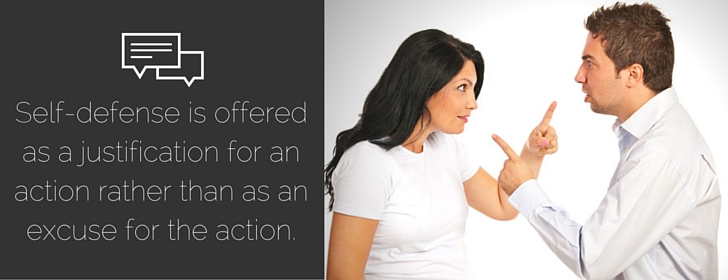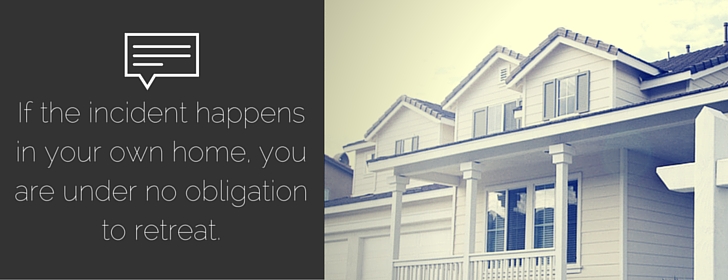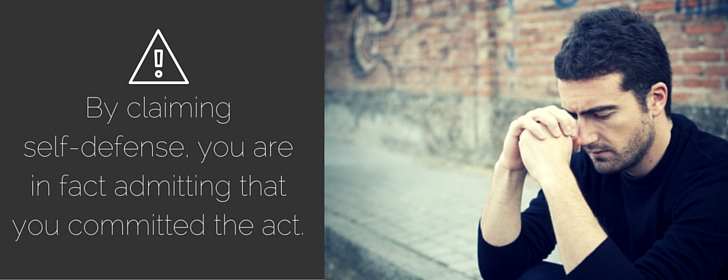Probably the oldest legal defense put forth by those persons charged with crimes and tried by criminal courts on those charges is the defense of self-defense. We are all sympathetic to the concept of self-defense – it’s something that we all instinctively understand. The universality of the legal right of self-defense has its root in a number of historical sources. Although self-defense is perhaps the oldest legal defense and has been one of the most successful historically, the reality is that if you are accused of a crime in the 21st century in the United States, self-defense can also be one of the most uncertain defense strategies. If you are arrested and charged with a felony or a misdemeanor, discuss your options and alternatives with an experienced criminal defense attorney before settling on any legal defense strategy, and in the New York City and Long Island areas, speak first with an experienced Long Island criminal defense lawyer.
The legal right of self-defense (and by extension the right to the defense of others) is the right of persons to use reasonable force to defend one’s own life or the lives of others, including, in certain circumstances, the use of deadly force. Going back a few centuries, self-defense is a legal defense found in the Book of Exodus. However, the modern self-defense legal principle is built on the ancient Roman concept of dominium, the Roman legal principle that any attack on the members of a family or on the family’s property was the legal equivalent of a personal attack on the family patriarch or pater familias. In England, the Statute of Gloucester in 1278 allowed defendants who killed in self-defense to apply to the king for a pardon. Early modern English political theorists and philosophers such as Thomas Hobbes and John Locke poetically described the right to defend oneself as the “first law of nature.”
It is important to understand that self-defense is offered as a justification for an action rather than as an excuse for the action. In other words, by offering self-defense as a legal defense, you are not making an excuse for a crime, but rather you are asserting that no crime was in fact committed. Today in the United States, the general rule is that a person may use such force as reasonably appears necessary to defend himself or herself against an apparent threat of unlawful and immediate violence from another person or persons. In cases involving force that is not deadly, the person must reasonably believe that their use of force was required to prevent immediate, illegal physical harm. When deadly force is involved, the person must also reasonably believe that deadly force was imperative to prevent great bodily harm or death. To employ the legal defense of self-defense, you must be able to prove that someone else was about to kill, injure, rape, or unlawfully touch you imminently – that is, immediately. If you acted only because of a threat of future harm, no matter how believable the threat or how substantial the harm, you may not argue that you acted in self-defense.
DOES THE LAW REQUIRE YOU TO RETREAT?
Many states – although not New York – no longer require you to “retreat” or to try and escape from an aggressor prior to the use of deadly force. And even in the states like New York that do require you to retreat, there is no legal obligation to retreat when retreat is unsafe or when you are inside your own home. The question of retreat in such circumstances was shoved into the media spotlight again several years ago by the controversial George Zimmerman/Trayvon Martin case out of Florida. Primarily because the state of Florida does not, like New York, require you to retreat and allows you, unlike New York, to “stand your ground,” Zimmerman was acquitted of all charges in the death of Trayvon Martin.
So what exactly does the law say about self-defense and “standing your ground” in the state of New York? It’s difficult to give a precise answer that would apply to an actual case, because every case is different and is judged individually. In the state of New York, the legal doctrine of “justification” is about proportionality and reasonableness. Your response to an attack must be proportional to that attack. If someone punches you in the nose, you are probably – in most cases – justified in punching him or her back in the nose to defend yourself. However, in that same hypothetical circumstance, you would not be justified in shooting your attacker – unless your attacker responded to your self-defensive punch in the nose by pulling out a knife or a gun. In other words, it all depends.
For a self-defense legal defense to succeed in a courtroom, the threat of attack must have been immediate. Here’s an example: if a local organized crime “enforcer” comes to your place of business and says that he wants weekly payments or he will bust your kneecaps, and you respond with force, you can’t use justification as a defense. You cannot use self-defense as a defense if you are the initial aggressor, and you cannot act justifiably in self-defense against a promised future attack. The primary legal issue in the state of New York is whether you genuinely believed that you had to use physical force to defend yourself and whether that belief was reasonable. In other words, you need to actually have believed that physical force was necessary, and it must have been a situation where an average person would come to the same conclusion. It is this second condition – the theoretical “average person’s” perception – that frequently helps prosecutors defeat a claim of justified self-defense.
Justified self-defense gets even more complicated as a legal defense when the charge is homicide and you claim that you used what the law calls “deadly force” in your self-defense. You are allowed to respond proportionally to an assailant so long as you use only “physical” force. However, if “deadly” force is used, the law is different. You may only use deadly physical force when you believe – and when your belief would be reasonable to an average person – that deadly physical force is being used against you. Secondly, you may not use deadly physical force if you have some way to retreat to safety. However, if the incident happens in your own home, you are under no obligation to retreat. This is the “castle doctrine,” the legal concept that you are allowed to defend your home if necessary without having to retreat.
WHAT ARE THE RISKS OF A “SELF-DEFENSE” DEFENSE?
You should understand that if you are prosecuted for a crime and you choose to employ self-defense as your legal defense, you are essentially waiving your right to offer any other type of defense. By claiming self-defense, you are in fact admitting that you committed the act that you are accused of committing and that you acted with conscious intent rather than accidentally. Thus, there can be genuine risks associated with a self-defense strategy. A good criminal defense lawyer will be able to look at the specific details of your own case and advise you regarding the pros and cons of claiming that you acted in self-defense. In some cases, your attorney may recommend an entirely different defense strategy.
The reality – whether we like it or not – is that self-defense is more likely to be a successful criminal defense when it is offered by someone who is “respectable in the community” with no significant criminal record, and when the “victim” is a known criminal or a person of questionable character. Anyone with a history of violence or with prior criminal convictions will typically have a much harder time persuading a jury that their use of force was reasonable, defensive, or justifiable. If there is any question about who was the criminal and who was the victim, self-defense may quickly become difficult or impossible to prove, and when such doubts emerge, self-defense probably will not succeed as a defense strategy
IF YOU ARE ARRESTED, WHERE CAN YOU TURN?
If you are arrested and charged with a crime in the New York City or Long Island area or anywhere else, before even considering self-defense or any other defense strategy, you must retain the legal representation you need at once and contact an experienced criminal defense attorney. Do not attempt to act as your own lawyer. Answer no questions from the police. Instead, insist – politely – on your constitutional right to remain silent and on your right to have an attorney present during any interrogation by the police. Do not plead guilty to any criminal charge or agree to any plea bargain prior to consulting with a good criminal defense lawyer.
In New York City or on Long Island, if you are charged with a crime, contact an experienced Long Island criminal defense attorney as quickly as possible. In a nutshell, self-defense can be an effective legal defense, but only in specific kinds of criminal cases. Your defense attorney will consider a number of factors, including the level of threat that you faced, the level of force that you used, your personal background, and a number of other items before recommending self-defense as your defense strategy.














Comments are closed.